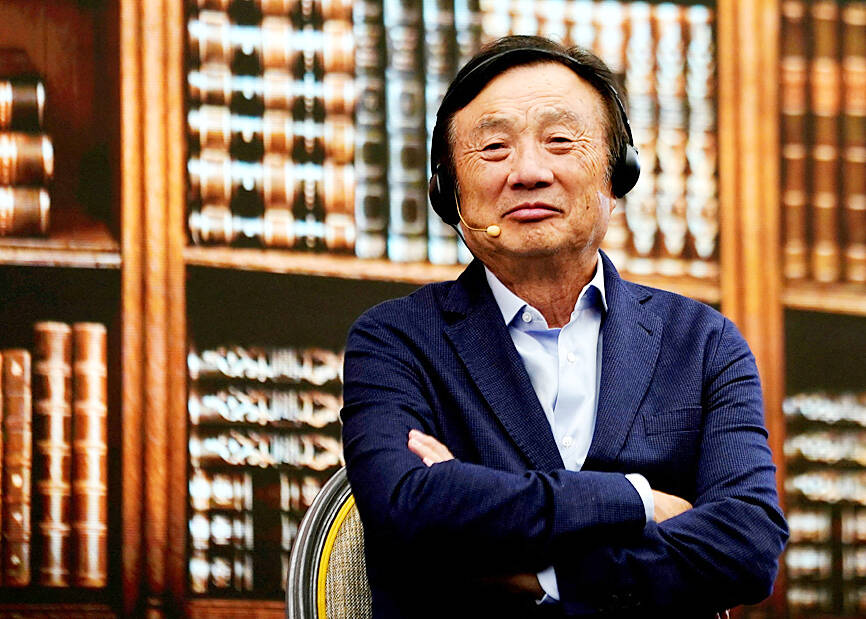Huawei Technologies Co (華為) has replaced more than 13,000 parts in its products that were hit by US trade sanctions, the Chinese tech giant’s founder said, according to a speech transcript from last month posted on Friday by a Chinese university.
Ren Zhengfei (任正非) said Huawei had over the past three years replaced the 13,000 components with domestic Chinese substitutes, and had redesigned 4,000 circuit boards for its products, the transcript posted by Shanghai Jiao Tong University said.
“As of now, our circuit board [production] has stabilized, because we have a supply of domestically produced components,” Ren said.

Photo: Reuters
He did not give details about which specific parts were being sourced from within China or what proportion of Huawei’s total supply they represented.
Since 2019, Huawei, a major supplier of equipment used in 5G telecommunications networks, has been the target of successive rounds of US export controls.
Ren made the remarks in a talk to Chinese technology experts on Feb. 24, the transcript said.
Ren said there were still “difficulties with manufacturing advanced microchips in China, so we have to find other ways of making up ground.”
Huawei spent US$23.8 billion on research and development last year, and plans to invest more in the coming years as profits rise, he added.
“We’re still in a difficult period, but have not stopped on the road towards progress,” Ren said.
The founder said the company had built its own enterprise resource planning system, called MetaERP. With an expected launch next month, it is to help run Huawei’s core business functions, including finance, supply chain and manufacturing operations.
Ren said Huawei has no plans to launch a rival to the popular large language model ChatGPT, but said Microsoft Corp, the backer of the application’s developer, OpenAI, would not be the only dominant player.

To many, Tatu City on the outskirts of Nairobi looks like a success. The first city entirely built by a private company to be operational in east Africa, with about 25,000 people living and working there, it accounts for about two-thirds of all foreign investment in Kenya. Its low-tax status has attracted more than 100 businesses including Heineken, coffee brand Dormans, and the biggest call-center and cold-chain transport firms in the region. However, to some local politicians, Tatu City has looked more like a target for extortion. A parade of governors have demanded land worth millions of dollars in exchange

Hong Kong authorities ramped up sales of the local dollar as the greenback’s slide threatened the foreign-exchange peg. The Hong Kong Monetary Authority (HKMA) sold a record HK$60.5 billion (US$7.8 billion) of the city’s currency, according to an alert sent on its Bloomberg page yesterday in Asia, after it tested the upper end of its trading band. That added to the HK$56.1 billion of sales versus the greenback since Friday. The rapid intervention signals efforts from the city’s authorities to limit the local currency’s moves within its HK$7.75 to HK$7.85 per US dollar trading band. Heavy sales of the local dollar by

Taiwan Semiconductor Manufacturing Co’s (TSMC, 台積電) revenue jumped 48 percent last month, underscoring how electronics firms scrambled to acquire essential components before global tariffs took effect. The main chipmaker for Apple Inc and Nvidia Corp reported monthly sales of NT$349.6 billion (US$11.6 billion). That compares with the average analysts’ estimate for a 38 percent rise in second-quarter revenue. US President Donald Trump’s trade war is prompting economists to retool GDP forecasts worldwide, casting doubt over the outlook for everything from iPhone demand to computing and datacenter construction. However, TSMC — a barometer for global tech spending given its central role in the

An Indonesian animated movie is smashing regional box office records and could be set for wider success as it prepares to open beyond the Southeast Asian archipelago’s silver screens. Jumbo — a film based on the adventures of main character, Don, a large orphaned Indonesian boy facing bullying at school — last month became the highest-grossing Southeast Asian animated film, raking in more than US$8 million. Released at the end of March to coincide with the Eid holidays after the Islamic fasting month of Ramadan, the movie has hit 8 million ticket sales, the third-highest in Indonesian cinema history, Film